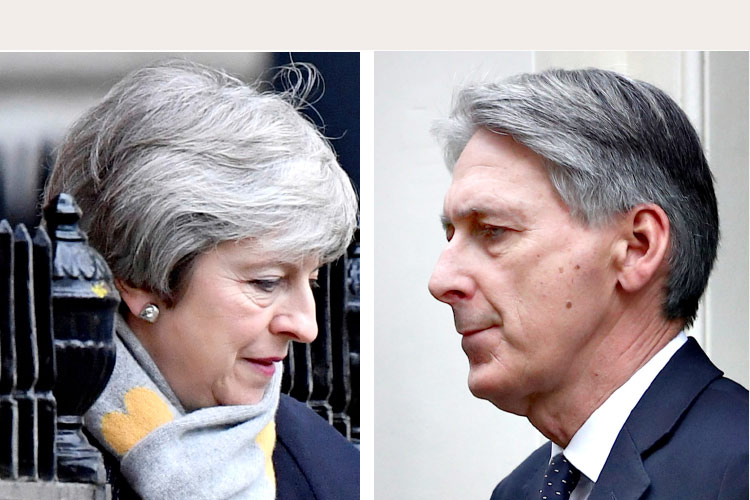
Theresa May and Philip Hammond.
By Sean O’Grady
I have long taken the deeply unfashionable and politically naive view that Philip Hammond would make an excellent prime minister and leader of his party. He has his flaws, heaven knows, but they are much magnified only in the eyes of those who think an ideal leadership contest would comprise a choice between Boris Johnson, Priti Patel, Dominic Raab and Jacob Rees-Mogg. The latest votes, to rule out the ruinous no-deal Brexit, demonstrates he is far more in touch with the Commons and the country’s mood than his prime minister.
Hammond has been long been resented by Theresa May for his dour refusal to spend money on her pet schemes, and, I suspect, she is resented by him for her economic illiteracy. He has now shown some superior political literacy.
Had she won her disastrous snap election in 2017 she would have sacked him (and Sajid Javid, as it happens). Instead, he went on the BBC’s Andrew Marr Show the Sunday after the debacle to explain that had he been allowed to make the economic case for her government in the campaign, rather than be locked in a Treasury broom cupboard, they might still have a majority. He was right, too.
Now Hammond is acting, and speaking out again. He, with like-minded colleagues such as Amber Rudd, can demand and win a free vote on a fundamental aspect of policy, trying to rule out the no-deal option. He can also, as he did on Wednesday, go rogue and show an example of leadership that his nominal boss seems incapable of performing. As he might say himself, in his sardonic way, “someone has to”.
As it happens, Spreadsheet Phil is right. The most obvious way forward, if we really do want to leave the EU, is to scrub out another red line, settle for membership of the EU customs union as a treaty commitment, and see the new deal pass the Commons with a vast majority. I’d say it would need a referendum too, and staying in would be better and simpler, but anyway – we could get on with the rest of our lives.
It would, for a start, eliminate most, if not all, of the Irish border issue, and end the nightmarish backstop controversy. The border between Ireland and Northern Ireland would stay as soft as Michael Gove’s rosy cheeks, and the paramilitaries can put their toys away and save on their postage bills. Not only that, but all the dread fears about customs checks and delays at Calais and other ports will be simply washed away. Goods can flow freely, even if workers cannot.
That, then, is the meaning of compromise. The main problem – you can hear the objections already – is that “Global Britain” would not be able to conduct its own trade policy, and strike exciting treaties with the likes of China and the US. Well, I wonder. If the past few years have taught us anything, it is that trade deals are very difficult to complete even if you’re as quick-witted as Liam Fox and his team. Contrary to the parroted line that the UK is the fifth biggest economy in the world, if you take account of the vagaries of exchange rates then it is closer to being the 10th. India and China will only give us the time of day if we don’t loosen up on visas for their students and business people. I wonder what the backwoods of the Tory party would make of that. I’ll leave it there.
This is no way to run a country. May should listen to her chancellor, for a change, and save her country from her shabby deal, one that nobody much wants. “Bloody difficult woman” is no longer the back-handed compliment she likes to think it is. The House of Commons and the cabinet need to start being a bit more bloody difficult with her, too. In the votes on no deal our MPs have, at long last, stirred themselves to act in the national interest. It is a good moment for democracy.
The Independent